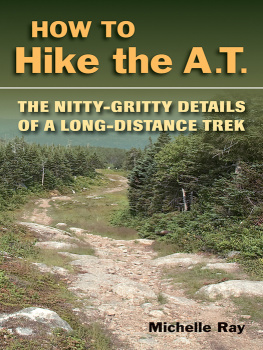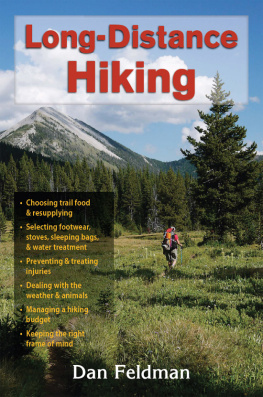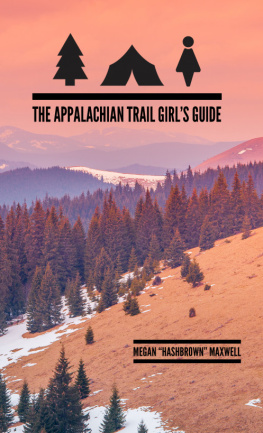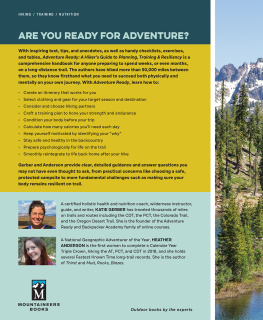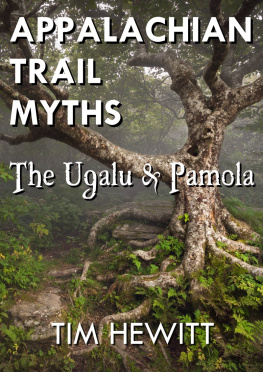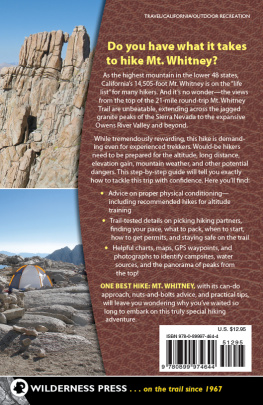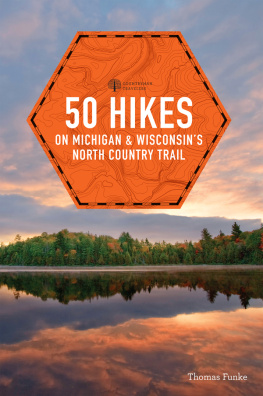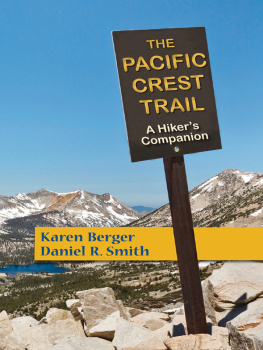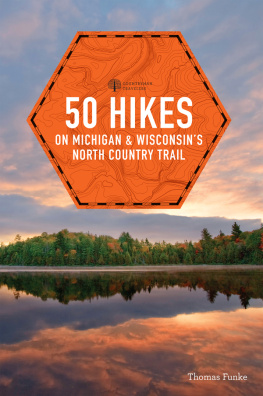How to Hike
the AT
The Nitty-Gritty Details of a Long-Distance Trek
MICHELLE RAY
STACKPOLE
BOOKS
Copyright 2009 by Stackpole Books
Published by
STACKPOLE BOOKS
5067 Ritter Road
Mechanicsburg, PA 17055
www.stackpolebooks.com
All rights reserved, including the right to reproduce this book or portions thereof in any form or by any means, electronic or mechanical, including photocopying, recording, or by any information storage and retrieval system, without permission in writing from the publisher. All inquiries should be addressed to Stackpole Books, 5067 Ritter Road, Mechanicsburg, PA 17055.
Printed in the United States of America
10 9 8 7 6 5 4 3 2 1
First edition
Cover design by Wendy A. Reynolds
Library of Congress Cataloging-in-Publication Data
Ray, Michelle.
How to hike the AT : the nitty-gritty details of a long-distance trek /
Michelle Ray. 1st ed.
p. cm.
Includes bibliographical references.
ISBN-13: 978-0-8117-3542-1
ISBN-10: 0-8117-3542-7
1. HikingAppalachian Trail. 2. Appalachian TrailDescription and travel. I. Title. II. Title: How to hike the Appalachian Trail.
GV199.42.A68R39 2009
796.510974dc22
2008025800
Contents
Preface
Everywhere is walking distance if you have the time.
Steven Wright
I t was the summer of 2005 when I first discovered that the Appalachian Trail, more familiarly known as the AT, was a relatively short train ride from my New York City apartment. Sweltering summer days, the high price of entertainment in the city, and a need for space and fresh air guided me to the woods. After backpacking a couple hundred miles or so of the AT by the end of summer, I was completely enchanted with it and decided to plan for a long hike in 2007.
Upon making this decision, I became obsessed with the beauty, culture, and challenges of the trail, and I dove headfirst into examining every aspect of it. I had a lot of logistical questions but was also very interested in the people, traditions, and history behind long-distance hiking on the AT. Theres a wealth of information available on hiking the AT, but I wasnt able to find any single truly comprehensive resource geared toward planning a long-distance hike. There was also a missing link between the ideal hiking conditions found in the existing how-to guides and the bona fide day-to-day duct tape and ramen existence of long-distance hikers. I decided to compile all of the information I could lay my hands on prior to my trip and revise it, where necessary, after my long hike was completed. Since then, Ive hiked in every state and logged thousands of miles on the AT, testing my ideas about long-distance hiking while learning from my experiences and those of other hikers. I completed all but a hundred-some miles of the trail in a single hike, and Ive done numerous section hikes.
If youre reading this book, odds are that you have already decided to do a long-distance hike of your own. Or, possibly, you are a backpacking enthusiast and would like to get a better idea of what long-distance hiking is all about. This book is geared toward prospective AT long-distance hikers with all ranges of backpacking experience. Whether youve spent one night out on the trail or a hundred, this book has something to add to your backpacking knowledge.

I hope this resource will assist you in making good decisions when planning for your trip or, if you havent seriously considered attempting a long-distance hike, help you decide if a long hike is a good option for you (and, in my opinion, its a great option for just about everyone who is able to walk). Thousands of people have completed long-distance hikes since Earl Shaffers pioneering thru-hike in 1948, and the success rate for long-distance hikers is increasing thanks to better gear, on-trail support, and the widespread availability of information on the web, in magazines, and in books such as this one.
Introduction

The longest journey begins with a single step.
Lao-tzu, Tao Te Ching
L ong-distance hikers cannot be placed in the same category as other athletes. They sleep half of the day, eat their body weight in fatty foods, rarely shower, and typically move about two to three miles per hour. In this sport, all-you-can-eat buffets and naptime reign supreme. Yet hikers are regarded with awe and the Appalachian Trail long-distance hiker is a modern day enigma. Perhaps this has something to do with climbing mountains or dealing with bears.
So what, exactly, is a long-distance hike? The definition varies according to whom you ask, but generally its considered to be a hike of days, weeks, or months that necessitates complex logistics such as resupply or seasonal gear replacement. Long-distance hikes include anything from a hundred-mile hike to a thru-hike, when a hiker travels the entire length of the trail in a single year.
Typically, a long-distance hiker is not a corporate-sponsored athlete. He or she doesnt spend extensive time training or attending competitions. Though thru-hiking speed records do exist, most hikers on the AT have no time concerns other than completing their hike before the winter weather hits and the hiking season officially ends. They literally mosey their way along the 2,175-mile-long path, stopping frequently to snack and enjoy the scenerynot that the moseying doesnt get decently strenuous in spots.
Appalachian skyline in New England
Appalachian Trail long-distance hikers are representative of all walks of life: extreme athletes, recent high school or college graduates, those with career burn-out, refugees from failed relationships or midlife crises, and retirees. This ragtag assortment assembles year after year at the northern and southern ends of the Appalachian Trail and at all points in between to begin the journey.
Hiking any of the 2,175 miles between Springer Mountain in Georgia and Katahdin in Maine is no easy task. A long hike can be a downright brutal experience, complete with poor weather, rough terrain, and wear and tear on the body. However, on the trail you will likely encounter beauty, camaraderie, and other pleasures that more than compensate for the difficult days. And, at the end of the trail, you will have an experience that will be one of the most positive and memorable of your lifetime.
1
The Short History of a Long Trail
Little did I dream more than fifty years ago when I sat down with two men in the New Jersey Highlands and outlined to them my idea of a footpath through the Appalachians, that such a plan would be translated into the institution that has now come to pass.
Benton MacKaye
T he Appalachian National Scenic Trail, more commonly known as the Appalachian Trail or the AT, is a 2,175-mile-long footpath running from Springer Mountain in Georgia to Katahdin in Maine. The trail winds its way up and down mountains through the states of Georgia, North Carolina, Tennessee, Virginia, West Virginia, Maryland, Pennsylvania, New Jersey, New York, Connecticut, Massachusetts, Vermont, New Hampshire, and Maine. It is populated by periodic shelters and is marked along its full length with two-by-six-inch white painted blazes.

